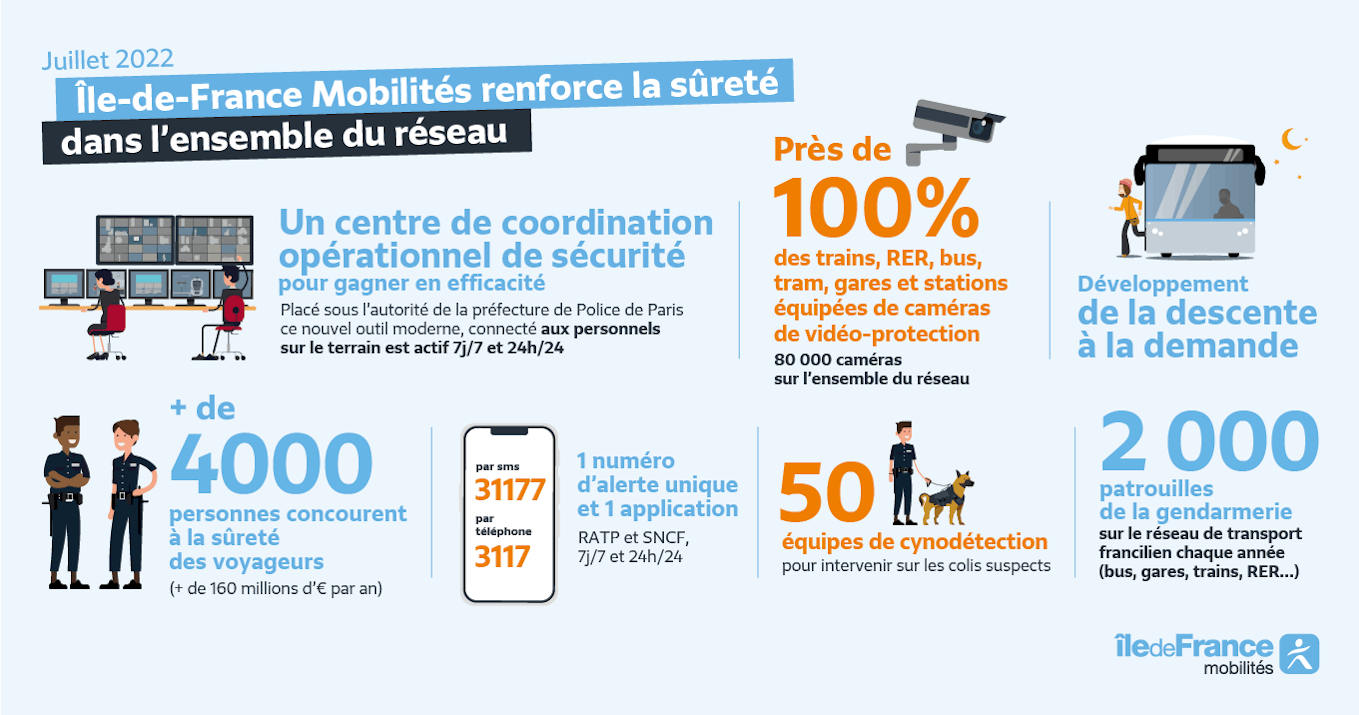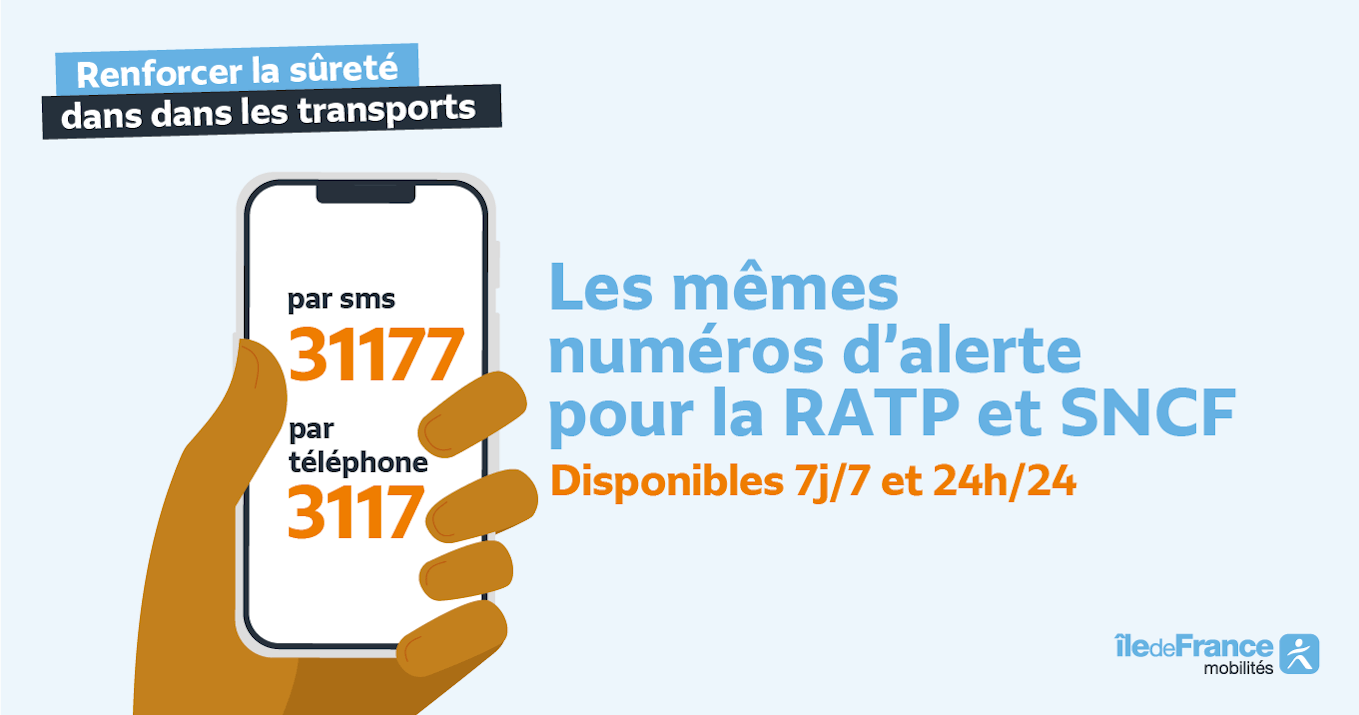- On the RATP network, more than 5,300 agents are present in the network's stations and stations, who can be mobilized directly to alert the Network Protection and Security Group (GPSR), made up of 1,000 agents, including a hundred teams deployed on the network every day. The RATP security department also deploys plainclothes security teams whose missions include the fight against violence against women.
- On the SNCF network, in Île-de-France, 5,000 agents are present in stations and on trains. 740 security agents (SUGE) also criss-cross the Île-de-France, and 172 mediators work on the lines to fight against incivility.
Additional human resources for the RATP and the SNCF
As part of its contracts signed in 2016 with the RATP and the SNCF, the number of staff in the field will be increased by 490 people: 290 agents for the SNCF (SUGE, mediators and commercial agents) and 200 agents for the RATP (GPSR and mobile teams accompanying buses after midnight).
In addition, the canine detection brigades are deployed. There are 50 of them in 2022. These teams participate in the overall increase in the security services and free some of them from the verification of baggage forgotten in the trains to devote themselves to their other missions. These teams make it possible to reduce response times following alerts to abandoned parcels, so the "removal of doubt" can be done in about fifteen minutes instead of an hour. On the SNCF network, there has been a 122% increase in forgotten bags, i.e. more than 150 interventions per year since 2014.
Staff trained to take care of victims of harassment
Since 2016, all RATP agents in contact with passengers have received training dedicated to the care of victims of harassment as part of their initial training. This specific module was developed in partnership with Miprof (Interministerial Mission for the Protection of Women against Violence and the Fight against Human Trafficking). During this training, RATP agents are trained in the reception and care of victims of violence and sexual harassment, in knowledge of the legal framework and the means of combating and alerting available in public transport.
In 2017, SNCF Transilien began training its SUGE employees with a specific module on sexual harassment in its premises. A training course developed with the Miprof in order to be as close as possible to the victims' experiences. The 740 security guards learned from professionals how to spot deviant behavior during their rounds, they learned to take charge, listen, recognize the status of victim and refer them to the police. In 2018, station agents will benefit from the same training.
A reinforced human presence on the bus networks of Grande-Couronne
Île-de-France Mobilités also finances around 520 mediation agents for 70 networks, including 520 additional since 2016. These mediators provide a reassuring presence, their work is appreciated by both operators and passengers. However, they are not trained or equipped to carry out deterrent patrols (islanding) or to accompany controllers, as these situations can be a source of conflict. Unlike the RATP and the SNCF, the bus companies in Grande-Couronne did not have staff dedicated to these tasks.
Île-de-France Mobilités has therefore decided to grant more resources to operators to strengthen security in the buses of Grande-Couronne, with 200 agents specifically dedicated to security (currently being recruited), for an estimated budget of 10 million euros over four years. The first of them took up their duties at the start of the 2017 school year. They will be able to carry out deterrent rounds and intervene in the event of incivility.
Around €130 million is paid each year by Île-de-France Mobilités to operators to ensure a human presence: SUGE, GPSR, SNCF mediators, Optile and RATP night buses.
These staff contribute to the safety of our users (1 January 2022)
- GPSR agents (RATP) 945 (agents in the field) 1350 (Field + Headquarters)
- 835 SUGE agents (SNCF)
- 50 Dog Detection Teams
- + 200 security officers in the outer suburbs
- 18 agents in the Noctilien hubs and 100 agents in mobile bus support teams after midnight (RATP)
- 176 SNCF mediators
- + 500 Optile mediators
- Private security at RATP (+100) and SNCF (1000)
- 1000 patrols/year of gendarmerie reservists on the Grande Couronne network
- 1000 patrols/year reservists of the gendarmerie on the TN network
- 1,120 agents of the Regional Sub-Directorate of the Transport Police (SDRPT)Finally, Valérie Pécresse proposed to the Ministry of the Interior free public transport for police officers in order to strengthen their presence on public transport.
Call terminals, station and station staff, "3117" alert number or "31177" SMS, "3117 alert" application, multiple ways not to remain impassive!
In order to actively fight against sexual harassment in transport, the Île-de-France Region, Île-de-France Mobilités, SNCF and RATP are committed to raising awareness among all passengers and reminding victims and witnesses that concrete solutions exist to raise the alarm.

